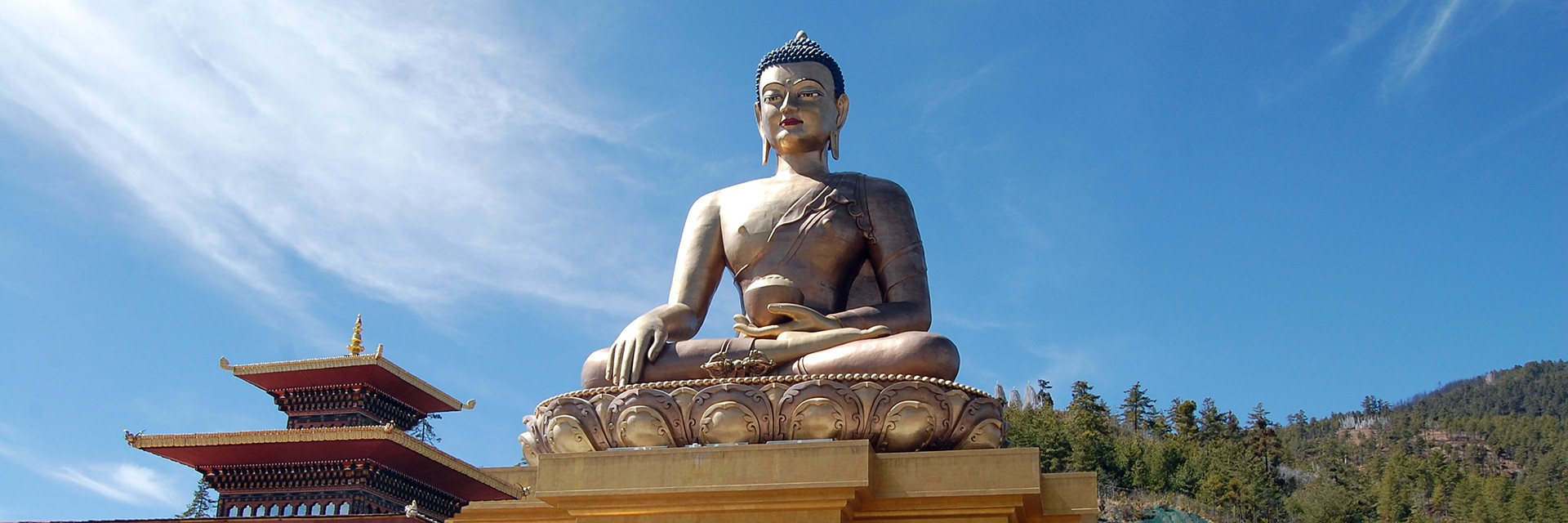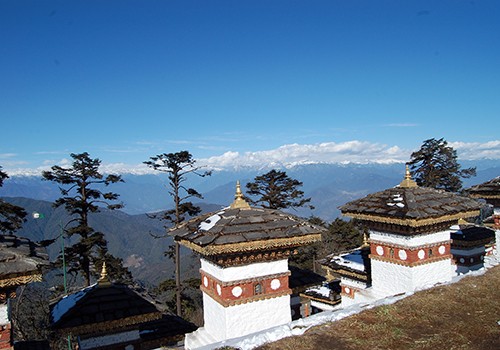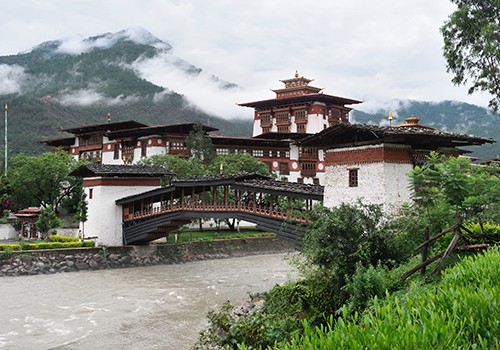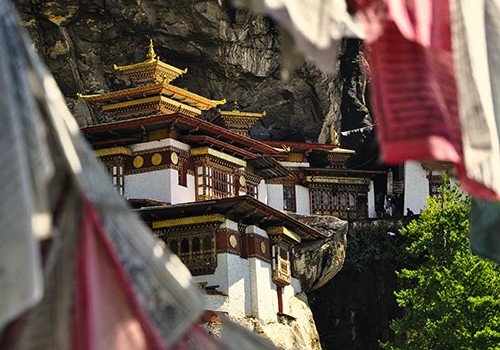The four-day Bhutan impression tour follows the traditional travel path from Paro to Thimphu, Bhutan's capital. Top sights such as TaktshangGoemba, Kyichu Lhakhang, Bhutan traditional heritage museum, Tashichho Dzong, and others will be visited. The exhilarating hike to the spectacular Tiger's Nest will reward you with breathtaking views of Paro Valley. You will learn about real Bhutanese Buddhist culture and traditional Bhutanese weaving art during your thrilling travel through Paro and Thimphu.
Bhutan Tour and Sightseeing 04 days
- Duration: 4 Days
- Diffculty Level: Easy
- Destination: Bhutan
- Best Time: Mar - May | Sep - Dec
- Activity: Tours, Hiking
Highlights
- Mountain and Peaks
- Old and beautiful temples
- Stunning view of Paro valley
- Museum and Monasteries
- Bhutanese Handicraft
- A rich history and diverse natural life
Itinerary
Bhutan, the country of the "Thunder Dragon," greets you. During your flight, we're confident you'll be awestruck by the breathtaking view of the gorgeous Himalayas, particularly the tall Mt. Jumolhari and Jichu Drake Peaks. They are, however, merely a little appetizer. Our Bhutan guide and driver will be waiting for you at the Paro international airport and will then bring you to your accommodation.
After a quick break at your hotel, we may visit the Kyichu Lhakhang (also known as Kyerchu Temple), Bhutan's oldest and most beautiful temple, Kyichu Lhakhang, surrounded by fields, flowers, and hills, has the eight-year-old Sakyamuni Buddha statue, historic relics, exquisite murals, and various Buddhist scriptures, among other things. Later, see the Rinpung Dzong in Paro. Rinpung Dzong, a castle built in the 17th century to safeguard Paro Valley, is located in the suburbs of Paro City and offers stunning views and a sense of inner serenity. We will travel to Thimphu, Bhutan's capital, in the evening and spend the night there. Stay in Thimphu for the night.
Thimpu, Bhutan's capital, is devoid of corny skyscrapers and heavy traffic. Instead, Thimpu is recognized for its scenic Bhutan dzong, fresh air, and friendly locals, all of which are surrounded by undulating mountains. Today's tour begins with a visit to the Late King's Memorial Chorten, followed by visits to the National Library, Folk Heritage Museum, and Hand-made Paper Factory, as well as the School of Arts and Crafts, where you will get a panoramic view of Bhutan history and learn more about traditional textile and handicraft making.
The centrepiece, of course, is a visit of the Tashichho Dzong (Thimpu Dzong), one of Bhutan's most stunning dzongs and the country's government offices. We shall return to Paro later.Spend the night in Paro.
We'll begin our walk to TaktshangGoemba (also known as Tiger's Nest) first thing in the morning.TaktshangGoemba (3120 meters), perched on a cliff overlooking Paro Valley, is Paro's most famous sight as well as Bhutan's holiest shrine. Guru Padmasambhava (also known as Guru Rinpoche) is claimed to have flown here on the back of a tigress and meditated for three months in the cliffside caves. A panoramic view of Paro Valley may be seen from here.
After lunch, we visit Bhutan's National Museum, which is shaped like a spherical watchtower. You may learn about Bhutan's rich history and discover the diverse natural life as well as the wonderful local culture and arts. Finally, we travel to Drukgyel Dzong, where you may marvel at the lovely settlement at its foot.
Our tour guide will take you to Paro International Airport today for your flight to your next destination. The tour service has come to an end.
As a competent Travel agency, Yolo Hike can also assist you in planning a trip from Bhutan to Nepal or Tibet.)
- All ground transportation by private Vehicle
- Bhutan Visa and all necessary permits
- Airport transfers by private vehicle
- Breakfast, Lunch and Dinner at designated restaurants or hotels
- Accommodation at 3 star hotel sharing basis
- A qualified & licensed English-speaking guide
- An experienced driver
- Entry fees & road permits
- Government fee, royalty, taxes & surcharges
- Mineral bottled water
- Set of traditional costume (to be return at the end of your stay)
- Full service & assistance before, during and after your Bhutan trip
- International Flight Ticket
- Expenditure of personal nature
- Travel Insurance (can be arranged with us)
- Tips for the guide and driver
- Alcoholic drink
Additional Info
Meals and Accommodation
Himalayan Mentor provides full board service for all travel-related activities in Bhutan as part of an organized package. Every day, three meals will be served: breakfast, lunch, and dinner. All of the meals are hygienically prepared and are a perfect combination of a healthy diet. All of the hotels in Bhutan that we use are comfortable, clean, and provide all of the necessary amenities. Himalayan Mentor has carefully selected the best hotels in Paro, Thimpu, and other major Bhutanese cities to accommodate you. You will be accommodated in tents while trekking and meals will be served by a kitchen staff team.
Climate
You'll see a variety of climatic conditions in Bhutan, depending on altitude and season. It's sweltering and humid to the south, while the uphills and mountains to the north are blanketed in snow. Due to rain shadow effects, rainfall can vary across a small distance. Spring, Summer, Autumn, and Winter are the four seasons that we experience. The rainy season begins in July and August, and Bhutanese believe that the rainy season will conclude in September with a festival called Thrue (beautiful rainy day). The seasons of spring and fall are ideal for tourists visiting Bhutan. Due to snowfalls, the temperature lowers below zero in the winter. The days are usually hot, while the nights are usually frigid.
Bhutanese Beliefs
Bhutanese people are god-fearing, peace-loving people who regularly incorporate Buddhist values into their daily lives. Nonviolence and compassion for all sentient beings are essential Buddhist philosophy principles that are deeply ingrained in Bhutanese culture. Prayer flags in the breeze, Chortens (stupas), monasteries, and twirling prayer wheels are all common sights, with people sending petitions through prayer flags and maintaining an unbroken line of communication with heaven.
Religion
Today, Bhutan is the only country in the world that practices the Tantric form of Mahayana Buddhism. Guru Padma Sambhava introduced Buddhism to the country in the 8th century AD. Religious festivals are known as 'Tsechus' and 'Dromchoes,' which represent amity, peace, and compassion, are held annually at various times throughout the kingdom. These vibrant festivals are a time for people from all walks of life to come together decently dressed in their ceremonial attire.
Similar Trips
![Bhutan Tour 05 days]()
Best of Bhutan Tour 05 days itinerary
Duration: 5 Days![Bhutan Cultural Tour]()
Bhutan Cultural Tour
Duration: 4 Days![Bhutan Highlight tours]()
Bhutan Highlight tour 03 days
Duration: 3 Days




